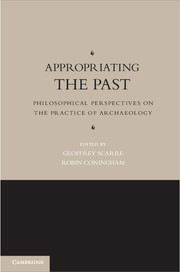Book contents
- Frontmatter
- Contents
- Contributors
- Editors
- Chapter 1 Introduction
- Part One Claiming the Past
- Chapter 2 The Values of the Past
- Chapter 3 Whose Past? Archaeological Knowledge, Community Knowledge, and the Embracing of Conflict
- Chapter 4 The Past People Want
- Chapter 5 The Ethics of Repatriation
- Chapter 6 On Archaeological Ethics and Letting Go
- Chapter 7 Hintang and the Dilemma of Benevolence
- Part Two Problems of Meaning and Method
- Part Three Problems of Ownership and Control
- References
- Index
Chapter 6 - On Archaeological Ethics and Letting Go
Published online by Cambridge University Press: 05 December 2012
- Frontmatter
- Contents
- Contributors
- Editors
- Chapter 1 Introduction
- Part One Claiming the Past
- Chapter 2 The Values of the Past
- Chapter 3 Whose Past? Archaeological Knowledge, Community Knowledge, and the Embracing of Conflict
- Chapter 4 The Past People Want
- Chapter 5 The Ethics of Repatriation
- Chapter 6 On Archaeological Ethics and Letting Go
- Chapter 7 Hintang and the Dilemma of Benevolence
- Part Two Problems of Meaning and Method
- Part Three Problems of Ownership and Control
- References
- Index
Summary
What is the nature of true morality?…[I]t must be a kind of ethics involving letting go of one's own interest on behalf of others, being ready if necessary to sacrifice one's own interests for them, even on behalf of an enemy.
– George Ellis (2004)Yep, son, we have met the enemy, and he is us.
– Walt Kelly (1971)Not letting go of cherished ideas or objects can bring all sorts of trouble and can cause no small amount of pain. In this chapter, I contend that letting go is an important process in the development and application of archaeological ethics. In fact, letting go is an imperative if archaeology is to evolve as a discipline. Letting go of ethics may seem counterintuitive and somehow unethical because many of us think of ethics as morals, values, or principles to which we must hold fast instead of the tools they actually are. These days, especially with so many stakeholders to whom we are said to be accountable, many archaeologists seem to find themselves bogged down in all sorts of ethical quagmires, or they worry that they will be. A quick look at the history of archaeology, however, shows that this really isn't so new.
Our archaeological predecessors struggled hard to become a discipline, which included developing what they thought of as ethical practice. The nineteenth-century shift away from antiquarianism demanded an ethic of systematic excavation and data recording, which forced archaeology toward science, piling on additional strata of ethical practice. A peculiarly Western epistemology, science was a good fit with colonialism, which heaped on another layer of ethics. A key notion was that the Other would eventually disappear, so part of archaeology's growing ethical burden was to salvage what remained of the Others’ pasts. Archaeology became a kind of scientific colonialism (Galtung 1967: 13). Bolstered by technological advances, archaeologists also sought to discover and interpret the past of the Other, and in doing so, they developed an ethic of stewardship in order to protect the Others’ physical remains – sites, artefacts, human remains – for all humanity. By the 1970s, the positivistic truths of processual archaeology eclipsed pasts known using other epistemologies, and cultural heritage management emerged as a sibling to archaeology.
- Type
- Chapter
- Information
- Appropriating the PastPhilosophical Perspectives on the Practice of Archaeology, pp. 98 - 118Publisher: Cambridge University PressPrint publication year: 2012
- 6
- Cited by



